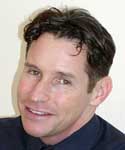-
- Personally and professionally, gay governor has uphill fight
- In Utah, same-sex marriage amendment hits unexpected bump
- Legal battle continues over Louisiana same-sex marriage ban amendment
- Judge denies relief to out-of-state same-sex couples
- People of faith ask: How would Jesus vote?
- Openly gay man appointed judge in busy Detroit court
- National News Briefs
- World News Briefs
commentary
Public sex – the legal side of lovers’ lane
Published Thursday, 26-Aug-2004 in issue 870
Beyond the Briefs
I’ve written in the past about how police often target gay men for enforcement of so called “public sex” laws, while ignoring similar offenses committed by straight people. Now a deputy district attorney in Santa Barbara has admitted to the Los Angeles Daily Journal that there is truth to the charge.
A year ago, Santa Barbara Sheriff’s deputies arrested 10 gay men who allegedly engaged in lewd conduct near a local beach in Santa Barbara. The lewd conduct charges are based on the California Penal Code, which makes it a crime to touch the buttocks, genitals or female breasts in a public place in the presence of people who might be offended. The charges are serious because prosecutors can make those charged register for life as sex offenders. Secondly, convictions can result in revocations of licenses.
In the past, I’ve noted that the courts in California have strictly defined what is a “public place” within the meaning of this statute. A room in an adult bookstore is not a public place. Courts have also made it clear that average persons (not police officers) have to be offended by the conduct. People who go to adult sex clubs are not offended by sexual conduct or they wouldn’t be there. But folks, gay or straight, caught having sex near a beach are, arguably, engaged in sex in a public place where others, like kids, could be present who would be offended by such conduct.
So the 10 men arrested in the Santa Barbara case argued that police targeted them because they are gay men (the “cruising while gay” defense). Defense attorneys persuaded Santa Barbara Superior Court Judge Brian E. Hill to order the Sheriff’s Department to give arrest records for all of those who had been previously arrested and charged with “lewd conduct” matters.
“And by and large what we found was that the arrests were limited to gay men,” said Brian Cota, deputy district attorney. He added that the men were having sex. Attorney John Clarkson, an attorney for the defendants, said, “Well, that’s what heterosexuals do everywhere in places called lovers’ lanes. And there’s been no sting against them.”
Another defense lawyer, Robert Sanger, said, “What I argued in court was that there was never any similar case against heterosexuals. They never set up a heterosexual sting operation on a nude beach with a female officer luring men into bushes, which is what they did in this instance.”
… no one can defend sex that is taking place in public restrooms during the day, especially where children are likely to wander in. The California Supreme Court ruled several years ago that police cannot target one segment of the population to the exclusion of others. So, while the conduct engaged in by the men may have been illegal under the penal code, the charges could be dismissed if the defendants showed they were targeted because of their sexual orientation.
The interesting twist in this case involved an emerging trend in cases of this type. Many in our community and the courts have begun to recognize a distinction between teens who have sex on the beach (because they have no place to go) and individuals, gay and straight, who are addicted to sex in public places.
Nobody seems to care anymore what happens in bathhouses or even in adult bookstores. That’s because it’s behind closed doors.
By contrast, no one can defend sex that is taking place in public restrooms during the day, especially where children are likely to wander in. In cases like this, the individuals are likely to be prosecuted on felony charges involving sexual abuse of children. And a number of people have complained about sexual activity by men in public places, especially places like gym saunas, steam rooms and showers.
It used to be that gay men had nowhere else to go but restrooms for sex. Gay leaders argued that gay men were targeted. But today, especially with the Internet, men can find sex partners without having to go to public places. So the concern is that those who regularly put themselves at risk for arrest or confrontation by others suffer from sexual addiction or extreme cases of exhibitionism or voyeurism.
Rather than simply jail the 10 men, they have had their sentences put on hold. They have to complete six classes offered by the Pacific Pride Foundation, a Santa Barbara-based GLBT and HIV/AIDS advocacy group. Upon completing the classes, their charges will be reduced to infractions.
“The purpose of the classes is to explore the issues gay men face as well as the culture of cruising,” said Deputy District Attorney Brian Cota. “But the classes will also address other more appropriate ways for gays to express sexuality that won’t be in violation of the law.”
|
|
Copyright © 2003-2025 Uptown Publications


